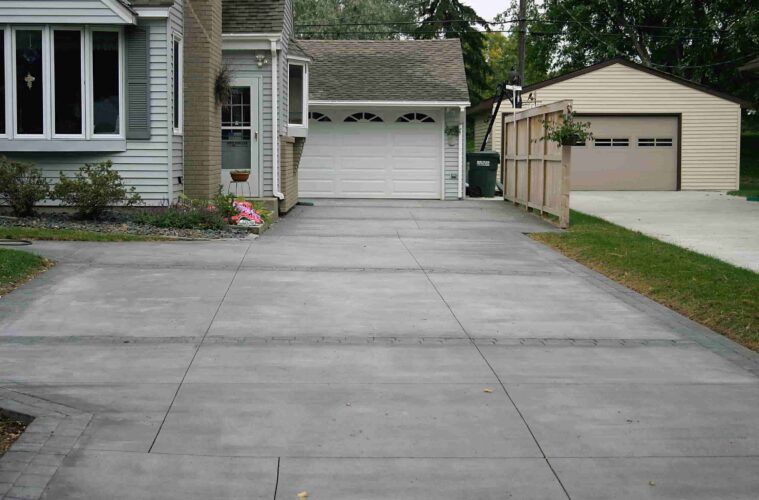When it comes to enhancing the curb appeal and functionality of your property, the installation of a concrete driveway in NJ is one of the best investments you can make. Not only does it offer durability and ease of maintenance, but it also provides a versatile, weather-resistant surface capable of withstanding New Jersey’s varying climate. This comprehensive guide will explore everything you need to know about the installation of concrete driveway services in NJ, covering benefits, key considerations, and essential steps for choosing the right contractor.
Why Choose Concrete for Your Driveway?
The installation of a concrete driveway has become increasingly popular in NJ due to concrete’s strength, longevity, and low maintenance. Concrete driveways can last 30 years or more with proper care, and they offer a range of finishes, from sleek and polished too decorative and textured. Here’s why homeowners and businesses in NJ choose concrete for their driveway projects:
- Durability: Concrete driveways can handle heavy vehicles, frequent use, and seasonal changes, making them a preferred choice for New Jersey’s climate.
- Low Maintenance: Unlike asphalt, which requires regular sealing, concrete is low maintenance. Periodic cleaning and occasional resealing keep it looking new.
- Aesthetic Flexibility: Stamping, staining, and texturing can make your concrete driveway unique and tailored to your style.
- Eco-Friendliness: Concrete is highly sustainable. Its reflective properties reduce the urban heat island effect, helping keep your property cooler in summer.
Factors to Consider Before Installation
Before beginning the installation of a concrete driveway in NJ, it’s essential to plan and consider factors that will impact both the quality and longevity of your driveway. Here are a few crucial considerations:
- Soil Type and Drainage: New Jersey has diverse soil types, which can impact how well your driveway will last. Contractors should test the soil to ensure it can support the weight of the concrete.
- Local Climate: NJ experiences freeze-thaw cycles, which can create cracks in concrete over time. Consider additives or special concrete mixes designed to resist this.
- Permit Requirements: Many municipalities in New Jersey require permits for driveway installations. Confirm with local authorities to ensure your project is compliant.
- Contractor Expertise: The installation of concrete driveway services in NJ demands experienced professionals familiar with local conditions, zoning laws, and best practices in concrete work.
Choosing the Right Contractor for Concrete Driveway Installation
The success of your driveway installation largely depends on the expertise of the contractor you choose. Here are steps to ensure you hire a qualified and trustworthy contractor in NJ:
- Check Experience and References: Opt for contractors with extensive experience in the installation of concrete driveway services in NJ. Ask for references and check reviews online to gauge their reputation.
- Verify Licensing and Insurance: Always verify that your contractor is licensed and insured to protect yourself from liabilities and potential mishaps.
- Request a Detailed Quote: Reliable contractors provide a clear and comprehensive quote, covering everything from material costs to labor and estimated completion times.
- Review Portfolio and Past Projects: Look at the contractor’s past projects to get an idea of their craftsmanship, style, and quality of work.
The Process of Concrete Driveway Installation
The installation of a concrete driveway involves several steps, each crucial to ensuring a durable, aesthetically pleasing result. Here’s a breakdown of the typical installation process:
1. Site Preparation and Excavation
Before the concrete is poured, the site must be prepared. This includes removing existing surfaces and excavating the area to ensure a stable base. In NJ, where soils vary, preparing a robust sub-base is essential to prevent future cracking or sinking.
2. Installing the Base
A stable base layer, typically made of compacted gravel or crushed stone, is laid to provide stability. This layer helps with drainage and prevents the concrete from cracking due to soil movement.
3. Setting Up Forms
Forms are placed around the perimeter of the driveway area to mold the concrete into the desired shape. Accurate formwork is essential to prevent uneven or improperly shaped edges.
4. Pouring and Leveling the Concrete
Once the base and forms are ready, contractors pour the concrete and level it with specialized tools to ensure a smooth surface. Proper leveling is crucial for an even, attractive finish.
5. Finishing Touches
The final stage involves adding any requested finishes or textures, such as stamping or staining. These finishing touches can significantly enhance the aesthetic of your driveway and set it apart from standard concrete surfaces.
Maintenance Tips for Your Concrete Driveway
Proper care after installation is crucial to maximize the lifespan of your driveway. Here are some maintenance tips to keep in mind:
- Sealing: Sealing your concrete driveway every 2-3 years can protect it from stains, weather damage, and cracking.
- Cleaning: Regularly clean your driveway to remove dirt, debris, and oil stains. Pressure washing can be particularly effective.
- Repairing Cracks Early: Address small cracks immediately to prevent them from expanding and causing more extensive damage.
Conclusion
The installation of a concrete driveway in NJ is a practical and attractive investment that can boost your property’s curb appeal, value, and functionality. By understanding the process, choosing an experienced contractor, and committing to regular maintenance, you can enjoy a durable and appealing driveway for decades. Whether you’re renovating an old driveway or planning a new one, the installation of concrete driveway services in NJ offers benefits that are both immediate and long-lasting.
From quality materials to expert craftsmanship, every detail in the installation process matters. Ensure that you select a contractor who understands the unique needs of New Jersey’s climate and soil conditions to provide a driveway that will stand the test of time.

